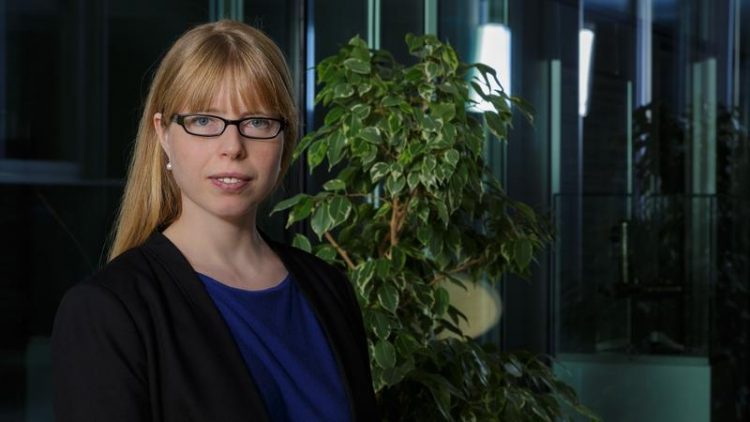Quantum systems correct themselves

Quantum theorist Christine Muschik IQOQI Innsbruck/M.R.Knabl
An international team of researchers from Innsbruck, Harvard, Copenhagen and Waterloo put forward a new method to protect quantum information stored in trapped ions. In their new proposal, the authors use dissipation (i.e. the interaction of a quantum system with its environment) to correct quantum states. Dissipation is typically considered harmful, but as demonstrated by Florentin Reiter and colleagues, it can be tweaked to work in a quantum engineer’s favor.
Standard quantum error correction schemes are performed by applying a sequence of gates in a logical quantum circuit and rely on measurements by classical devices. The new dissipative approach does not require a logical circuit and dispenses also with measurements.
“The whole error correcting process happens autonomously at the microscopic level, such that quantum systems can correct themselves”, said co-author Christine Muschik, of the Department of Theoretical Physics at the University of Innsbruck and the Institute of Quantum Optics and Quantum Information at the Austrian Academy of Sciences.
The new approach has important practical applications for high-precision measurements. “We showed how the new dissipative correction mechanism can be used to enhance the precision for sensing weak magnetic fields”, Muschik said. These results open new avenues for improving high-precision sensing schemes with trapped ions and constitute a stepping stone towards the paradigm of self-correcting quantum information processing.
Publication: Dissipative Quantum Error Correction and Application to Quantum Sensing with Trapped Ions. F. Reiter, A. Sørensen, P. Zoller, and C. Muschik. Nature Communications 2017 DOI: 10.1038/s41467-017-01895-5
Contact:
Christine Muschik
Department of Theoretical Physics
University of Innsbruck
phone: +43 512 507-52263
email: christine.muschik@uibk.ac.at
Christian Flatz
Public Relations Office
University of Innsbruck
phone: +43 512 507 32022
email: christian.flatz@uibk.ac.at
http://dx.doi.org/10.1038/s41467-017-01895-5 – Dissipative Quantum Error Correction and Application to Quantum Sensing with Trapped Ions. F. Reiter, A. Sørensen, P. Zoller, and C. Muschik. Nature Communications 2017
http://www.uibk.ac.at/th-physik/qo/ – Quantum Optics Group
Media Contact
All latest news from the category: Physics and Astronomy
This area deals with the fundamental laws and building blocks of nature and how they interact, the properties and the behavior of matter, and research into space and time and their structures.
innovations-report provides in-depth reports and articles on subjects such as astrophysics, laser technologies, nuclear, quantum, particle and solid-state physics, nanotechnologies, planetary research and findings (Mars, Venus) and developments related to the Hubble Telescope.
Newest articles

High-energy-density aqueous battery based on halogen multi-electron transfer
Traditional non-aqueous lithium-ion batteries have a high energy density, but their safety is compromised due to the flammable organic electrolytes they utilize. Aqueous batteries use water as the solvent for…

First-ever combined heart pump and pig kidney transplant
…gives new hope to patient with terminal illness. Surgeons at NYU Langone Health performed the first-ever combined mechanical heart pump and gene-edited pig kidney transplant surgery in a 54-year-old woman…

Biophysics: Testing how well biomarkers work
LMU researchers have developed a method to determine how reliably target proteins can be labeled using super-resolution fluorescence microscopy. Modern microscopy techniques make it possible to examine the inner workings…





















